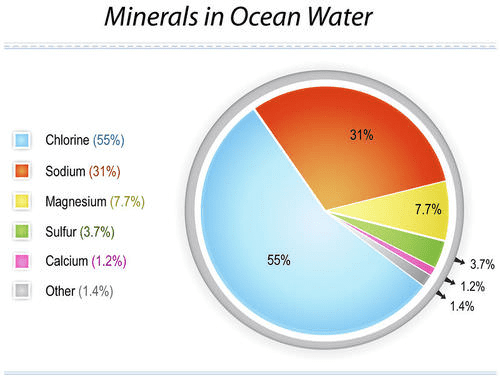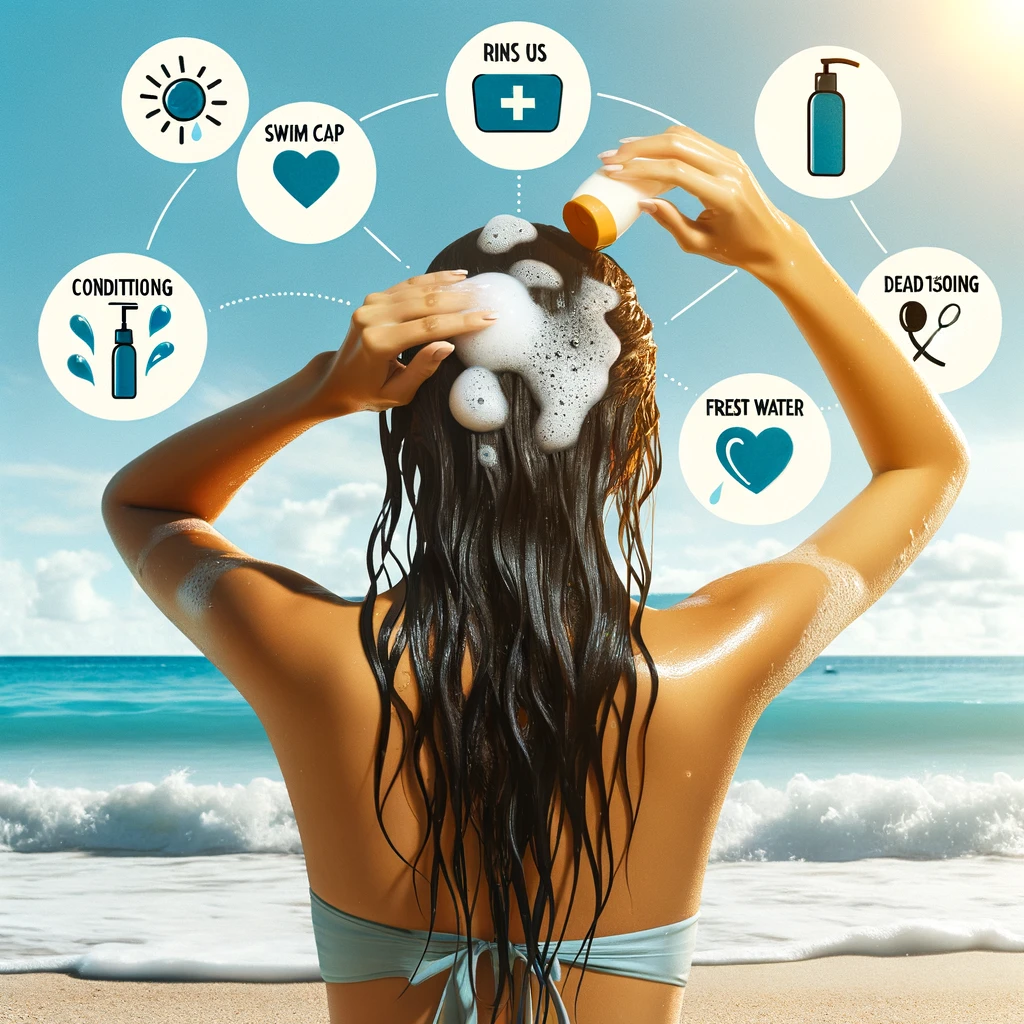Salt water, a mix of sodium chloride and water, is a natural element found abundantly in oceans and seas. Its unique composition has various effects on different materials, including human hair. With the increasing popularity of beach vacations and salt-based hair products, it’s essential to understand how salt water can impact your hair’s health and appearance. This article, written by hair specialist Linda Miller, explores the benefits and drawbacks of salt water on hair, offering insights on how to enjoy its advantages while mitigating potential risks.
Is Salt Water good or bad for your hair?
Linda Miller – InspiringHairstyles.com
Salt water, with its unique blend of minerals and properties, can be both a friend and a foe to your hair. While it offers benefits like natural cleansing, added texture, volume, and potential hair growth stimulation, it also poses risks such as dryness, brittleness, color fading, and scalp irritation.
Benefits of Salt Water for Hair
Salt water, often associated with beach waves and summer fun, has several surprising benefits for your hair. Here are some of the key advantages of salt water for your hair:
Natural Cleansing Properties
One of the primary benefits of salt water is its natural cleansing properties. Salt water can help to remove excess oils and product buildup from your hair and scalp. The salt acts as an exfoliant, gently scrubbing away dead skin cells and other impurities. This leaves your hair feeling cleaner and your scalp more refreshed. For people with oily hair, a dip in the ocean can provide a temporary relief from greasiness, giving hair a lighter and more voluminous appearance.
Adds Texture and Volume
Salt water is renowned for adding texture and volume to hair, creating the effortlessly tousled look that many people desire. The salt helps to plump up the hair shaft, making individual strands appear thicker. This is particularly beneficial for those with fine or limp hair, as it can create the illusion of fuller, more voluminous hair. Many beach-goers love the natural, wavy texture their hair gets after a day in the sea.

Potential for Stimulating Hair Growth
While the evidence is largely anecdotal, some believe that salt water can stimulate hair growth. The minerals in seawater, such as magnesium, potassium, and selenium, are thought to nourish the scalp and hair follicles. Additionally, the exfoliating properties of salt can help to clear away dead skin cells and promote better circulation to the scalp, which may encourage hair growth. Although more scientific research is needed to confirm these effects, many people swear by the revitalizing feel of a salt water rinse.
Enhances Curls
For those with naturally curly hair, salt water can enhance curl definition and reduce frizz. The salt helps to tighten the hair cuticle, which can make curls appear more defined and bouncy. This effect is similar to that of many salt spray products designed to mimic the look and feel of a day at the beach. Using salt water can be a natural and cost-effective way to enhance your curls without the need for additional styling products.
Detoxifies the Scalp
Salt water has natural antibacterial and anti fungal properties, which can help to detoxify the scalp. It can be particularly beneficial for individuals suffering from dandruff or scalp conditions like psoriasis and eczema. The salt helps to reduce inflammation and remove flakes, providing a soothing and cleansing effect. This detoxification can lead to a healthier scalp environment, which is essential for maintaining strong and healthy hair.

Drawbacks of Salt Water for Hair
While salt water has several benefits, it also comes with some potential drawbacks. Understanding these risks can help you take necessary precautions to protect your hair from damage.
Potential for Dryness and Brittleness
One of the most significant drawbacks of salt water is its potential to dry out your hair. Salt absorbs moisture, and prolonged exposure to salt water can strip your hair of its natural oils, leaving it dry and brittle. This can lead to split ends, breakage, and an overall lackluster appearance. If your hair is already prone to dryness, exposure to salt water can exacerbate this issue, making it more challenging to maintain healthy, hydrated hair.
Impact on Hair Color and Treatments
Salt water can also have adverse effects on hair color, particularly for those with dyed or chemically treated hair. The salt can cause color to fade more quickly and may alter the shade, especially for lighter or pastel hues. Additionally, salt water can strip away the protective coatings from treatments like keratin or relaxers, reducing their longevity and effectiveness. This can result in a need for more frequent touch-ups and treatments, which can be costly and time-consuming.
Risk of Scalp Irritation
For individuals with sensitive skin, salt water can cause scalp irritation. The abrasive nature of salt can lead to itching, redness, and even inflammation. If you have conditions like eczema or psoriasis, salt water exposure might exacerbate these issues. Additionally, if you have any cuts or abrasions on your scalp, salt water can cause stinging and discomfort, making it essential to take care when exposing your hair and scalp to the ocean.
Weakened Hair Structure
Repeated exposure to salt water can weaken the structure of your hair. The salt can penetrate the hair shaft, causing it to swell and then contract as it dries. This constant swelling and contracting can weaken the hair over time, leading to increased porosity and a rougher texture. As a result, your hair may become more prone to damage from everyday activities like brushing and styling.
Difficulty in Managing and Styling
Salt water can make your hair more difficult to manage and style. The added texture and volume, while beneficial for some, can lead to tangles and knots for others. If you have long hair, it might become more challenging to comb through after a day at the beach. Additionally, the drying effect of salt water can make hair less responsive to styling products, making it harder to achieve the desired look.
How to Minimize Damage from Salt Water
To enjoy the benefits of salt water without suffering from its drawbacks, it’s essential to take steps to protect and care for your hair. Here are some tips on how to minimize damage from salt water exposure:
Pre-Treatment and Protective Measures
Apply a Leave-In Conditioner: Before heading to the beach, apply a leave-in conditioner to your hair. This acts as a barrier, preventing salt water from penetrating the hair shaft and stripping away natural oils. Look for a conditioner with moisturizing properties to keep your hair hydrated.
Wear a Swim Cap: A swim cap can provide physical protection from salt water. It’s especially useful for those who swim frequently or have chemically treated hair. While it may not completely prevent water from reaching your hair, it significantly reduces exposure.
Rinse with Fresh Water: Before entering the ocean, rinse your hair with fresh water. Wet hair is less likely to absorb salt water, as it will already be saturated. Most beaches have showers or taps near the entrance for this purpose.

Post-Exposure Hair Care Tips
Rinse Thoroughly After Swimming: After a swim, rinse your hair thoroughly with fresh water to remove as much salt as possible. This helps to prevent the drying effects of salt water from lingering in your hair.
Use a Deep Conditioning Treatment: Treat your hair to a deep conditioning treatment after a day at the beach. This helps to restore moisture and repair any damage caused by salt water. Look for products with ingredients like shea butter, coconut oil, and argan oil for intense hydration.
Avoid Heat Styling: Give your hair a break from heat styling tools like blow dryers, flat irons, and curling irons. Salt water can leave hair more susceptible to heat damage, so it’s best to let your hair air dry and embrace its natural texture.
Recommended Hair Products for Salt Water Exposure
Clarifying Shampoo: Use a clarifying shampoo once a week to remove any residual salt and product buildup from your hair. Clarifying shampoos are formulated to deeply cleanse and detoxify the hair and scalp.
Hydrating Masks and Oils: Incorporate hydrating hair masks and oils into your routine. Masks with ingredients like honey, avocado, and aloe vera can provide deep hydration, while oils like jojoba and almond oil can help seal in moisture and protect the hair shaft.
Leave-In Sprays: Keep a leave-in conditioning spray on hand for quick hydration and protection throughout the day. These sprays are lightweight and can be applied to damp or dry hair, providing an easy way to keep your hair moisturized on the go.
Additional Tips for Scalp Care
Scalp Exfoliation: Gently exfoliate your scalp once a week to remove any dead skin cells and prevent irritation. You can use a specialized scalp scrub or make your own with natural ingredients like sugar and coconut oil.
Sun Protection: Protect your scalp from sunburn by wearing a hat or applying a scalp-specific sunscreen. Sunburned scalp can exacerbate dryness and irritation, making it important to take preventive measures.
Stay Hydrated: Drink plenty of water to keep your body and hair hydrated from the inside out. Proper hydration is essential for maintaining healthy hair and scalp, especially when exposed to drying elements like salt water and sun.
Balancing the Benefits and Risks
Salt water, with its unique blend of minerals and properties, can be both a friend and a foe to your hair. While it offers benefits like natural cleansing, added texture, volume, and potential hair growth stimulation, it also poses risks such as dryness, brittleness, color fading, and scalp irritation. The key to enjoying the advantages of salt water while minimizing the drawbacks lies in proper hair care.
By taking preventive measures such as using leave-in conditioners, wearing swim caps, and rinsing with fresh water before and after swimming, you can protect your hair from the harsh effects of salt water. Incorporating deep conditioning treatments, hydrating masks, and gentle hair care products into your routine can help restore moisture and repair any damage.
Ultimately, understanding how salt water affects your hair and taking proactive steps to care for it will allow you to enjoy the beach without compromising your hair’s health and beauty. With the right balance, you can make the most of salt water’s benefits while keeping your hair strong, vibrant, and well-nourished.


